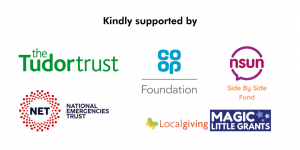This week, Jews around the world have been celebrating Hanukkah / Chanukah. We’ve asked Merissa Nathan Gerson, author of Forget Prayers, Bring Cake, to answer a few questions about the relationship between Hanukkah and grief.
What is Hanukkah, for those who don’t celebrate it?
Chanukah is essentially about survival in the face of destruction. It celebrates a small group that the dominant culture attempted to destroy, and its survival against all odds. The candles represent the miracle of a tiny amount of oil in a destroyed temple that burned for 8 nights. It is a time to celebrate the strength of the human spirit and the resistance to being fully assimilated.
Is celebrating Hanukkah different if you’ve experienced a bereavement during the year?
There is no sure rule when grief will show up. But it can be harder if you have traditions, if you lit your candles with someone you lost, if mustering joy is a challenge when your heart feels like it is sinking. Nostalgia can be excruciating when it is mixed with the loss of a loved one. My father’s death anniversary fell during Chanukah this year. I really appreciated the expectation to light candles each night, and more and more as the week went on. It was a reminder in some ways to have hope, and that something burns even in wells of mourning.
How do Hanukkah and grief interact?
Chanukah and grief – they don’t have to touch one another. Or they will. It is really specific to each person. When I was growing up we had a different party every single one of the 8 nights with family members, friends, school. My mother went to the kitchen at my non-Jewish school and taught them to make donuts for Chanukah. We fried latkes, potato pancakes at home. I have memories at all different homes, with all kinds of foods and fetes, and as an adult it can be very sad sometimes when that type of Jewish fervor is not in my midst. If there is no party, if there is not the food – it can feel abysmal. I generally use this time of year to create and deepen my relationship to my community wherever I am. I choose to make these traditional foods. And on the nights where it feels empty, it is painful – and also an important moment to lean into the actuality of loss – to remember that there were fuller times. It’s almost as if the candles, you light one the first night, and every night add another. So they get brighter and brighter. It’s almost as if the growing flame by night six is a reminder that fullness will return.
How did your own experience of grief inspire you to write Forget Prayers, Bring Cake?
This book is a memoir of losing my father. When he was dying I knew I wanted to write a grief guide. This is the book I wanted when I was grieving. I wrote this book so the same process might be less painful, less alone, than it was for me.
What advice do you have for anyone who is grieving this Hanukkah?
Invite a friend over. Call your grandma or your cousin or your high school teacher. Use the time, each night, to share the candle lighting with another. It makes such a difference. Even if you don’t pray. Even if you do. Making a choice to light candles feels good as the days grow darker and the sun sets earlier. Even if it isn’t like it was. Even if you miss your Dad, like I do, and the boisterous family parties, even if you are all alone – lighting a candle when you feel your worst, and inviting another to do it with you – I promise it will give you a nudge of warmth. And sometimes that warmth, for me, is the gateway to tears, to allowing the grief to flow through, and that is also totally ok. Feeling amazing is not always necessary. But feeling, and honoring what is real and really happening in our lives, this is everything. Happy Chanukah!
Merissa Nathan Gerson


